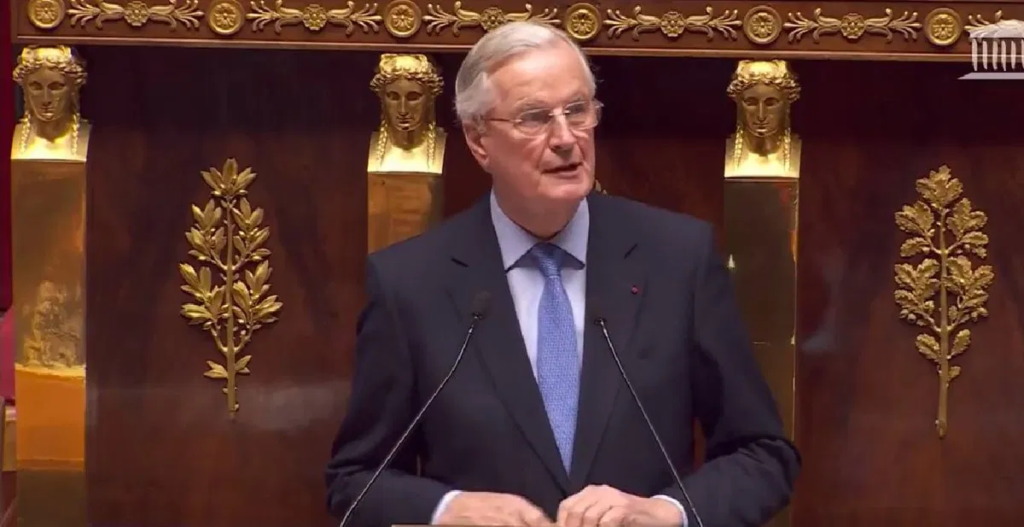For the first time in over 60 years, the French National Assembly has passed a historic no-confidence vote, toppling Prime Minister Michel Barnier’s government.
This unprecedented event has plunged France into political uncertainty, raising serious questions about the future of President Emmanuel Macron’s leadership and the stability of the Fifth Republic.
Political Turmoil and the Fall of Barnier
Michel Barnier’s government, which had been in power for only three months, faced an unexpected and tumultuous downfall. The collapse was triggered by a no-confidence motion proposed by the hard-left and supported by Marine Le Pen’s far-right party.
The motion, fueled by dissatisfaction over next year’s proposed austerity budget, passed with 331 votes in the 577-member chamber, highlighting the fragile political landscape after the summer’s snap elections.
These elections had resulted in a hung parliament, with no party achieving an outright majority. This political fragmentation gave the far-right significant leverage in parliamentary decisions.
Read : Come Naked for Exhibition: Marseille Museum of France Requests Its Visitors
Barnier’s downfall underscores the difficulties of governing without a clear mandate, especially when radical political factions find common ground to oppose the government. This cooperation between the hard-left and far-right reflects the deep divisions within French politics and suggests that ideological lines are blurring in the pursuit of power.
Read : Italy’s Meloni Wins EU Vote as Far-Right Gains Across the Bloc
President Macron now faces the daunting task of appointing a new prime minister amid growing discontent. His options are limited, as no new elections can be called within a year of the last vote.

This limitation forces Macron to seek a candidate who can unite a deeply divided parliament, a challenge that seems almost insurmountable given the current political climate. Potential candidates like Defence Minister Sebastien Lecornu and centrist ally François Bayrou are being considered, but their ability to navigate the complex political landscape remains uncertain.
The Broader Implications for Macron’s Presidency
The collapse of Barnier’s government represents a significant setback for Macron, who is already facing criticism from various quarters. His trip to Saudi Arabia, during which he marveled at the Al-Ula oasis, seemed disconnected from the domestic crisis brewing back home. Upon his return to Paris, he was met with a political firestorm that underscored the fragility of his administration.
Macron’s handling of the situation has drawn sharp criticism. Eric Coquerel, a hard-left MP, declared that the no-confidence vote marked the “death knell” of Macron’s mandate.
The president’s refusal to resign, despite calls from some quarters, indicates his determination to see his term through to 2027. However, the political instability and public unrest could make the remaining years of his presidency extremely challenging.
The far-right’s role in the government’s collapse has also raised concerns about the future direction of French politics. Marine Le Pen’s decision to support the no-confidence motion has been described as both strategic and risky.
While it demonstrates her party’s influence, it also exposes her to criticism from supporters who may be wary of the instability her actions could create.

Le Pen’s involvement in a high-profile embezzlement trial further complicates the situation. If found guilty, she could be barred from participating in the next presidential election, adding another layer of uncertainty to France’s political future.
The economic implications of the government’s collapse are also significant. France is bracing for public-sector strikes over proposed cost-cutting measures, with unions calling for civil servants, teachers, and air traffic controllers to walk off the job.
These strikes could disrupt essential services and further undermine confidence in the government’s ability to manage the country’s affairs. The threat of austerity measures, combined with political instability, has created a sense of crisis that could have far-reaching consequences for the French economy.
The Road Ahead: Challenges and Uncertainties
As Macron contemplates his next move, the challenges he faces are immense. The appointment of a new prime minister is just the first step in a long and arduous process of restoring stability. The new government will need to navigate a fractured parliament, address economic concerns, and rebuild public trust.
The upcoming reopening of the Notre-Dame Cathedral, a major international event, could provide a brief respite from the political turmoil. However, the presence of high-profile guests like Donald Trump underscores the global scrutiny France is under. Macron’s ability to manage this event while addressing the domestic crisis will be closely watched.
The parallels to the 1962 no-confidence vote that toppled Georges Pompidou’s government are striking. However, the current situation is arguably more complex, given the fragmented political landscape and the rise of radical factions.
The Fifth Republic, established in 1958, has faced numerous challenges, but the current crisis is among the most severe in its history.

Macron’s strategy moving forward will be crucial. Some observers have suggested that he could turn to figures from the left, such as former Socialist premier Bernard Cazeneuve, to build a broader coalition. However, such a move could alienate his centrist base and further complicate the political landscape.
The stakes are high, not just for Macron but for the future of French democracy. The collapse of Barnier’s government has exposed deep divisions within the country and raised questions about the viability of the current political system.
The coming months will be critical in determining whether France can navigate this crisis and emerge stronger or whether it will descend further into political chaos.
In the meantime, the public remains deeply divided. The far-right’s growing influence and the hard-left’s willingness to collaborate with them suggest that traditional political alliances are shifting.
This realignment could have profound implications for the future of French politics, potentially paving the way for more radical policies and further instability.
The political crisis in France is far from over. Macron’s ability to appoint a new prime minister and restore stability will be a major test of his leadership. The outcome of this crisis will not only shape the remainder of his presidency but also determine the future direction of the country.

